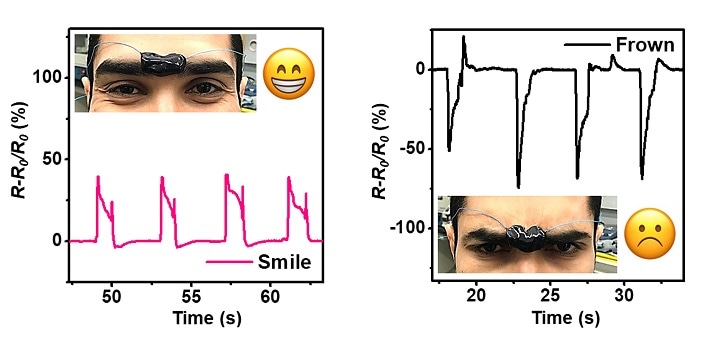Jun 18 2018
Researchers at KAUST have developed an electrically conductive hydrogel that optimizes strain sensitivity, self-healing, and stretchability like never before. “Our material outperforms all previously reported hydrogels and introduces new functionalities,” stated Husam Alshareef, professor of materials science and engineering.
 Signals from the electrically conductive hydrogel can clearly distinguish between different facial expressions. (Image credit: KAUST)
Signals from the electrically conductive hydrogel can clearly distinguish between different facial expressions. (Image credit: KAUST)
Smart materials with the ability to stretch, sense, and flex like skin have found various applications where they interact with the human body. Prospects range as wide as biodegradable patches helping in healing of wounds to touch-sensitive robotic devices and wearable electronics.
The material is a compound made by combining a metal-carbide compound called MXene and the water-containing hydrogel. Apart from its ability to stretch by over 3400%, the material can also quickly restore to its original state and adheres to various surfaces, such as skin. Even if it is cut into several pieces, it has the ability to quickly recover itself upon reattachment.
“The material’s differing sensitivity to stretching and compression is a breakthrough discovery that adds a new dimension to the sensing capability of hydrogels,” stated Yizhou Zhang, first author of the study, who is a postdoc in Alshareef’s lab.
This innovative strategy could prove highly significant in applications where changes in the skin are sensed and converted into electronic signals. For instance, a thin strip of the material attached to the forehead of a user can differentiate between various facial expressions, such as a frown or a smile. This ability could enable patients affected by extreme paralysis to control electronic equipment and communicate.
When thin strips of the material are attached to the throat, they can exhibit remarkable abilities to convert speech into electronic signals. This could enable the conversation of people with speech disorders to be clearly heard.
“There is real potential for our material in various biosensing and biomedical applications,” stated Kanghyuck Lee, co-author of the study.
More direct and exceptionally useful medical prospects include flexible wound coverings with the ability to release drugs to promote healing. Apart from being adhered externally to the skin, the coverings could even be applied internally on diseased organs. The researchers also hope to develop a smart material with the ability to monitor the shape and volume of an organ and alter drug release with respect to the signals produced.
A perfect ability would be to integrate medical sensing as well as therapy. Other interesting prospects are in robotics, where the material could be used, for instance, in touch-sensitive finger-like extensions for machinery.
It can also be used in anticounterfeiting, where slabs of the material and combined electronics are used to detect signatures with high sensitivity as they are written.
The KAUST researchers have come up with a long list of prospective applications that can be further investigated and developed. “There is great potential for commercialization,” Alshareef concluded.
Biosensors: electronic skin stretched to new limits
This electrically conductive hydrogel can stretch and reshape. It has the skin-like quality of sensitivity to touch. (Video credit: KAUST)